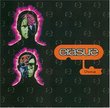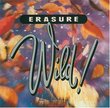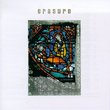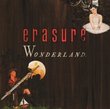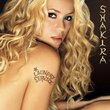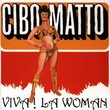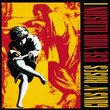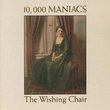| All Artists: Erasure Title: Circus Members Wishing: 0 Total Copies: 0 Label: Sire Records Original Release Date: 7/7/1987 Re-Release Date: 10/25/1990 Genres: Dance & Electronic, Alternative Rock, Pop, Rock Style: Dance Pop Number of Discs: 1 SwapaCD Credits: 1 UPC: 075992555425 |
Search - Erasure :: Circus
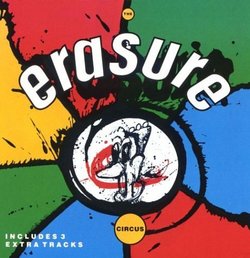 | Erasure Circus Genres: Dance & Electronic, Alternative Rock, Pop, Rock
Erasure's second album, 1987's The Circus is one of their most uncompromising in several ways. The duo's most unfailingly dancefloor-oriented release, much of The Circus consists of in-your-face Hi-Nrg disco beats largely ... more » |
Larger Image |
CD DetailsSynopsis
Album Description Erasure's second album, 1987's The Circus is one of their most uncompromising in several ways. The duo's most unfailingly dancefloor-oriented release, much of The Circus consists of in-your-face Hi-Nrg disco beats largely unvarnished by the pop savvy of later singles like 'Stop!' or 'Chains Of Love'. Similarly, The Circus finds singer Andy Bell in complete control of Erasure's lyrics--much of 1986's Wonderland had been written solely by partner Vince Clarke--and the emphatically gay singer bluntly tackles major themes on songs like 'It Doesn't Have To Be' and 'Hideaway'. A powerful, sometimes unsettling album. Mute. Similar CDs
Similarly Requested CDs
|
CD ReviewsGreat 80's synth-pop album Larry D. Rodriguez | Houston, TX | 04/28/2004 (5 out of 5 stars) "It's really sad, the number of times I have seen The Circus in used CD bins over the years. In a lot of ways, this is one of Erasure's strongest albums. As most people know, Wonderland, their first album, was something of a dud. The follow-up, Circus, is the first album to establish the "Erasure" sound throughout. More importantly, it tackles a lot of social issues without being preachy or precious, an uncanny ability Erasure always had. During the course of Circus, we hear about racial injustice (It Doesn't Have to Be), homophobia (Hideaway), peace & harmony (If I Could), and the plight of the working class (The Circus). However, with their catchy hooks, lyrics, and Andy's fine singing, you have enough else to concentrate on without feeling "preached" to!The album opens with It Doesn't Have to Be, which didn't get any airplay in America (at least in my memory), but is one of their best songs, in my opinion. Apart from being just a great song overall, it draws upon African percussion rhythms, and even has Andy singing in Swahili(?). Everytime I hear it, I think of the video, where he is waving the sparklers around. Next comes Hideaway, which has a lot of personal meaning for me as a gay man, although fortunately I wasn't "rejected by the people that I cared for!" Aside from the subject matter, it's another good song. Don't Dance seems to be a favorite with other reviewers, and I have to agree. It's a testimony to Erasure's talent that even the "non-singles" can sound this good. If I Could, which comes after, is another one that affects me. The song seems to be about a broken relationship, but the refrain, "If I could make the world a little better, you know I would," suggests something else entirely- a heartfelt cry for world peace. Sexuality is a notch below the rest, only because sonically it's somewhat jumbled. On the other hand, it's one of their most provocative songs ever, with lyrics like, "let's not pretend you're shy about it" and "strip it, do it". Victim of Love, which actually was a radio hit, is one of their most soulful ever. They tap into R&B and Soul, with such lyrics as "I'm gonna find you out." Leave Me to Bleed is another non-single that tops them all, a great song to listen to if you've ever been jilted by somebody. Sometimes was another radio hit- did any other synth-pop group use a saxophone melody like that? The Circus, while not an obvious choice for a single, is a stroke of genius, in how it mixes a "carnival" sound with such grave lyrics about the disenfranchisement of the working man. The album "proper" ends with Spiralling, which for my tastes could have been left off altogether, though it has its fans. The bonus tracks, sadly, are all duds. In the Hall of the Mountain King is just Vince Clarke's electro-reworking of a classical tune. And the remixes of Sometimes and It Doesn't Have to Be are nothing special, just your standard 80's "extended" mix, which doesn't reveal any new facet of the song, or make it danceable. It doesn't matter, though, because the album itself is so strong.If you think that Erasure's glory days begin with The Innocents, Wild!, or Chorus, think again." Erasure's First... True Album Eric Dapkewicz | Los Angeles, CA USA | 07/26/2002 (5 out of 5 stars) "I love "Wonderland", but consider it to be way too similiar to Yazoo (which Clarke had just came from). So "The Circus" is really the album that begins to give us a good understanding of Erasure - the band. From the hip "It Doesn't Have To Be" to the soft "Spiralling", this album has it all. And it is actually a concept album of all things. There's hints in the music from "Don't Dance" to "Spiralling" that lead all back to the actual song "The Circus". What I love about Erasure, is that they often have a number of songs on each album that are just as good as their singles or better. "Hideaway", "Leave Me To Bleed" and "Spiralling" are tracks that were never heard on the radio, but they are three of my favorite tracks from the album. There are hits as well like "Sometimes" and "Victim Of Love". If you are interested in Erasure and don't have this album, get it. You won't be disappointed." The Greatest Show on Earth? The Groove | Boston, MA | 10/27/2002 (4 out of 5 stars) "Erasure has named their second album "The Circus," in which Vince Clarke and Andy Bell are ringmasters of a show filled with synth pop bliss that's deeper than it appears. "Victim of Love," "Sometimes," and "It Doesn't Have to Be" are catchy, sugarcoated songs that have as much to offer in melody and craft as they do in hooks. The most attention-getting track is "Hideaway" whose lyrics tell the story of a gay teen coming to terms with his sexuality and the society that rejects him. It's not really that deep a social commentary on homophobia, but the song still passes with flying colors. Other favorite tracks are the title song and the gloomy "Leave Me to Bleed." A record like this should have made Erasure a flash-in-the-pan synth act whose appeal wouldn't last beyond the 1980s. But this fine record would lay as the foundation of a long and successful career that makes this duo among the most enduring and consistent in UK pop."
|

 Track Listings (13) - Disc #1
Track Listings (13) - Disc #1